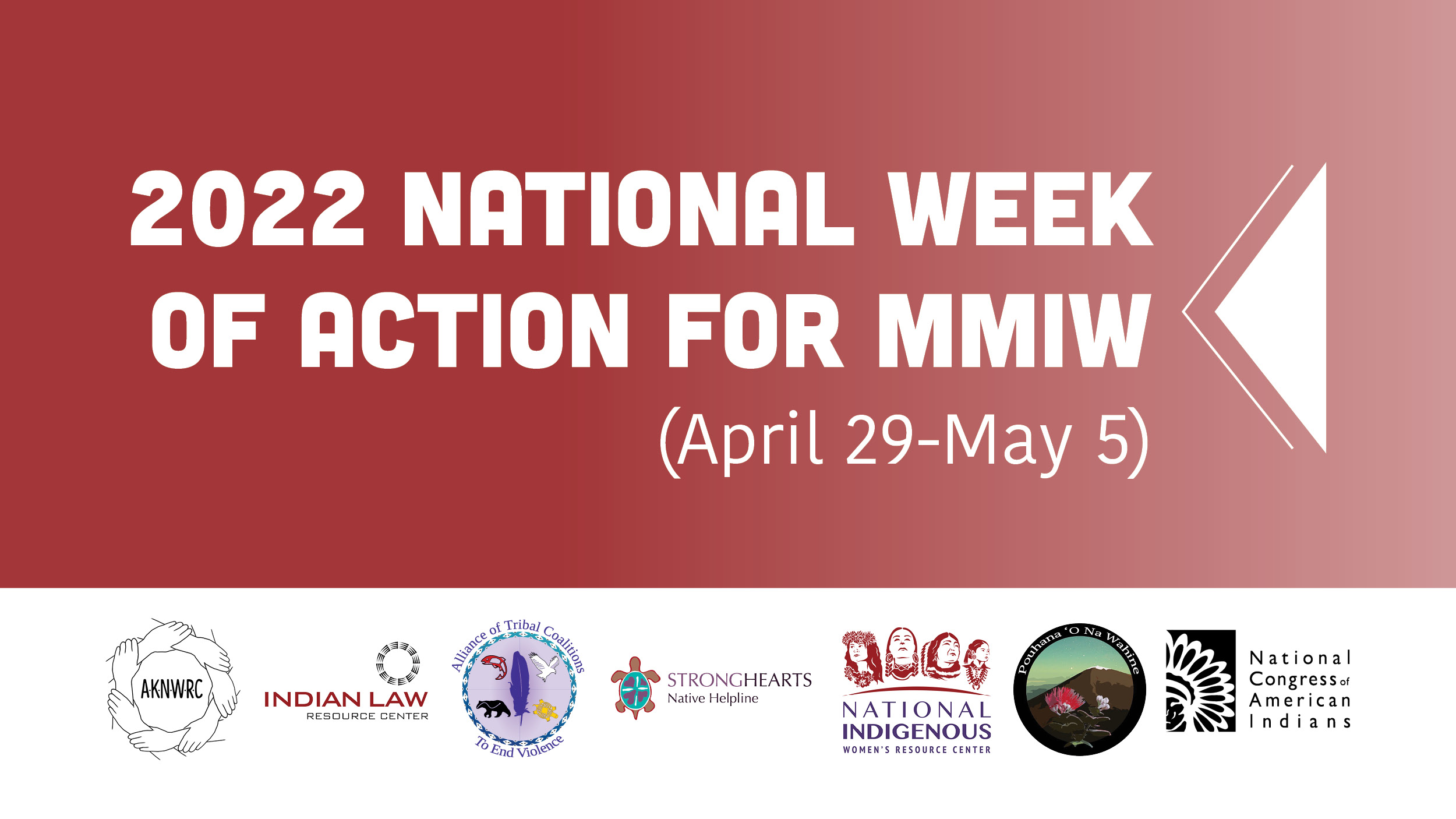Take Action For Missing and Murdered Indigenous Women 2022
Cross-posted with permission from the National Indigenous Women’s Resource Center.

In recognition of the 2022 National Week of Action for Missing and Murdered Indigenous Women, the National Health Resource Center on Domestic Violence hosted by FUTURES and the National Indigenous Women’s Resource Center have partnered to highlight the unique and important role health care can play in preventing and responding to violence against Indigenous women.
A National Week of Action for Missing and Murdered Indigenous Women (MMIW) provides a process for public healing and accountability for this injustice and honors those who have gone missing or been murdered. It is essential on the broadest level to acknowledge the historic and ongoing, current human suffering and death that global colonization has brought to Indigenous women. Violence against Indigenous women is preventable, and requires commitment across all systems and sectors of societies–including the public (governmental), private (business/corporations), nonprofit, educational, military, religious, health care, and mainstream media sectors.
The injustice of MMIW is the culmination of a spectrum of violence perpetrated disproportionately against Indigenous women—it reflects the intersection of domestic violence, sexual assault, trafficking, and many other crimes. Increasingly, health care professionals recognize that it is a major public health problem that causes grave and lasting harm to individuals, families and communities. Because most American Indian/Alaska Native and Native Hawaiian individuals are seen at some point by a health care provider, the health care setting offers a critical opportunity for early identification and primary prevention of violence and abuse.
These crimes occur due to a long history of government policies, practices, programs, and laws that create conditions that leave Indigenous women more vulnerable to such crimes than other women. Health systems can also play an important role in addressing these social determinants of health (SDOH). Indigenous women need economic stability, safe housing, education and quality jobs, health care, safe neighborhoods and environments, and social and community support. These SDOH provide independence, safety, and stability and can help to prevent violence from occurring in the first place. Increasingly, health systems are starting to assess their patients for a variety of SDOH, such as income, housing, education, and employment. Several assessment tools have been developed to help providers identify and address their patients’ unmet needs.
Trauma-informed, evidence-based prevention and intervention strategies have proved effective in reducing the incidence and health impact of violence. These strategies require commitment to by domestic and sexual violence advocates, healthcare providers, policymakers, healthcare systems, and funders. As healthcare delivery systems and the policy landscape are rapidly transforming, there is an opportunity to scale successful programs, policies, and innovations to better prevent and address MMIW and improve the health of communities.
Many survivors will never seek services at a domestic or sexual violence program, but they will likely come into contact with various health care systems. In addition, there exists less than 60 Native women’s shelters and less than 300 tribal domestic or sexual violence programs across the nation. Thus, health and public health workers play a critical role in supporting survivors, including the surviving families of missing and murdered Indigenous women, addressing violence, and engaging in violence prevention. This requires a plan to:
- Increase the capacity of public health programs and healthcare workers to use evidence-based interventions to address gender-based violence, including strategies to promote prevention: Healthcare workers must be trained to offer universal education on the impact of violence and trauma, how it is connected to health, and where to get support to every patient, not only patients who feel safe enough to disclose abuse.
- Ensure that healthcare institutions are trauma-responsive: All health care providers should have trauma-responsive training and health care institutions should support staff who are experiencing vicarious trauma, harassment at work, and current or past violence and trauma in their own lives.
- Support robust investment in and develop training programs for community health workers and patient navigators: Community health workers and patient navigators are key partners in expanding outreach to and preventing and responding to gender-based violence in the community. They can offer services to address violence and the social determinants of health that make people more vulnerable to violence.
- Increase partnerships between healthcare providers and Native domestic violence and sexual assault programs and tribal coalitions: Health centers and domestic and sexual violence advocacy organizations can partner to support survivor health and prevent violence. Through cross-trainings and warm referrals, providers and advocates are able to provide comprehensive coordinated care for survivors and their families. Visit ipvhealth.org for step-by-step guidance to create and sustain formal partnerships.
- Develop strategies for increasing options for counseling and mental health services, especially for the children and families of missing and murdered Indigenous women to ensure that the trauma of losing a loved one doesn’t result in experiencing additional health and social disparities.
To learn about promising practices, tools and resources for American Indian and Alaska Native communities check out these FUTURES and NIWRC resources, including the Restoration Magazine Special Edition on MMIW. View a recent Walking In Balance publication and read about strengthening youth leadership and building trust through community conversations:
Sign up for virtual events and find resources for the 2022 National Week of Action for MMIW at niwrc.org/mmiwnatlweek22.
Join the #MMIWActionNow Twitter Chat and Twitter Storm on Thursday, May 5th to speak out against MMIW and help call for justice.





